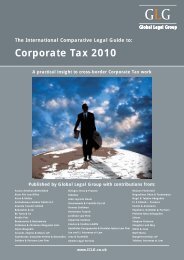BMR Edge-Tax & Regulatory Mont - BMR Advisors
BMR Edge-Tax & Regulatory Mont - BMR Advisors
BMR Edge-Tax & Regulatory Mont - BMR Advisors
You also want an ePaper? Increase the reach of your titles
YUMPU automatically turns print PDFs into web optimized ePapers that Google loves.
Show cause notices were issued to taxpayer alleging that the ‘soft serve’ ice-cream<br />
was classifiable as ‘Miscellaneous Edible Preparations’ under Tariff Act, attracting 16<br />
percent duty under heading 2105.00 –‘Ice-cream and other edible ice, whether or not<br />
containing cocoa’.<br />
The matter reached the SC in due course. The SC held that in the absence of a<br />
technical or scientific meaning or definition of the term ‘ice-cream’ or ‘soft serve’, the<br />
issue would have to be examined on the touchstone of the common parlance test. SC<br />
observed that headings 04.04 and 21.05 have been couched in non-technical terms.<br />
Heading 04.04 reads ‘other dairy produce; edible products of animal origin, not<br />
elsewhere specified or included’ whereas heading 21.05 reads ‘ice-cream and other<br />
edible ice’. Neither the headings nor the chapter notes/section notes explicitly define<br />
the entries in a scientific or technical sense. Further, there was no mention of any<br />
specifications in respect of either of the entries. On that basis, the argument that since<br />
‘soft serve’ is distinct from ice-cream’ due to a difference in its milk fat content, was<br />
rejected.<br />
Further, rejecting the taxpayer’s argument that ‘soft serve’ cannot be regarded as ‘icecream’<br />
since the former is marketed and sold around the world as ‘soft serve’, the SC<br />
held that the manner in which a product may be marketed by a manufacturer, does not<br />
necessarily play a decisive role in affecting the commercial understanding of such a<br />
product. What matters is the way in which the consumer perceives the product at the<br />
end of the day notwithstanding marketing strategies.<br />
It was also held that it is a settled principle in excise classification that the definition of<br />
one statute having a different object, purpose and scheme cannot be applied<br />
mechanically to another statute. Accordingly the taxpayer’s submission that the<br />
common parlance understanding of ‘ice-cream’ can be inferred by its definition as<br />
appearing under the Prevention of Food Adulteration Act, 1955 (“PFA”) cannot be<br />
adopted.<br />
In view of above, the SC held that ‘soft serve’ marketed by the taxpayer, during the<br />
relevant period, is to be classified under tariff sub-heading 2105.00 as ‘ice-cream’ and<br />
was liable to excise duty.<br />
CCE New Delhi v Connaught Plaza Restaurant Pvt Ltd New Delhi (2012 TIOL 114<br />
SC – CX)<br />
One time technical assistance fee charged for providing services such as putting up a<br />
restaurant in running condition, designing of food facilities and monthly fees for other<br />
services, right to use technical knowhow and brand name of franchisor cannot be said<br />
to be additional consideration for sale of confectionary, cakes etc by franchisor to<br />
franchisee<br />
The taxpayer operated a chain of restaurants and also manufactured confectionary<br />
items like cakes, pastries, cookies etc chargeable to central excise duty. The goods<br />
manufactured are cleared to their own restaurants and also to their franchisees. The<br />
taxpayer, in terms of the agreement with the franchisees, charged lump sum amount in<br />
the beginning as technical assistance fee, and thereafter a monthly amount as fixed<br />
percentage of the gross sales during the month.<br />
According to the Revenue Authorities, such lump sum amount and the monthly amount<br />
should also be added to the assessable value of the goods for payment of excise<br />
duty. The taxpayer submitted that there is no link between the price at which cookies,<br />
cakes and pastries etc manufactured are sold to their franchisees and the collection of<br />
one time technical assistance fee and monthly fee.<br />
Further, the taxpayer submitted that the technical fees and monthly fees is for<br />
providing certain technical assistance to the franchisees and for permitting them to<br />
operate by using the taxpayer’s brand name and business model, and the price<br />
charged is equal to the price adopted for clearance of same goods to the taxpayer’s<br />
own restaurants. Further, service tax has been discharged on said amounts under<br />
franchise services.<br />
The Tribunal took note of Rule 6 of Central Excise Valuation Rules, 2000 and held that<br />
the same applies when there is some supply of goods or services either free or at<br />
reduced cost from the buyer (franchisees in this case) to the manufacturer (the<br />
taxpayer in this case) for use in the manufacture of the goods which are to be sold to<br />
the buyer – thus, it was held to be inapplicable in this case.<br />
The amounts in question were being received for certain services rendered by the<br />
taxpayer to the franchisees. Further, as service tax had been paid on the said<br />
amounts, they could not qualify as additional consideration for sale.<br />
Therefore, there is no question for rejecting the normal price/ transaction value on<br />
which the duty has been paid.<br />
Nirulas Corner House Pvt Ltd v CCE Delhi [2012 (286) ELT 46 (Tri - Del)]<br />
Service tax<br />
Supplementary services provided by tour operator such as organizing local events/
















